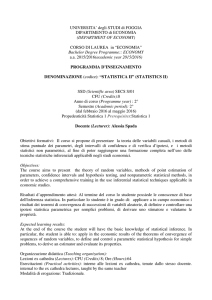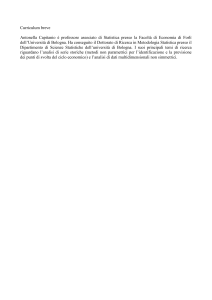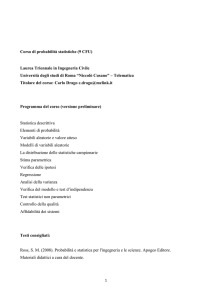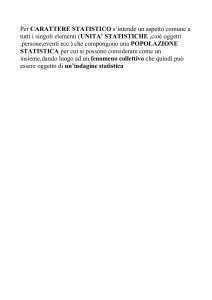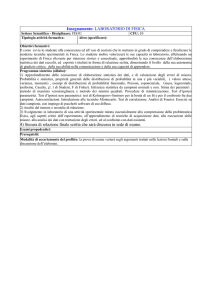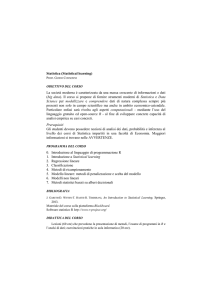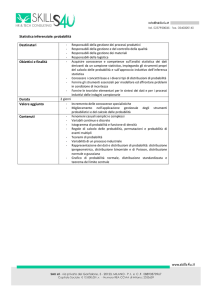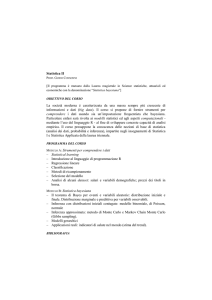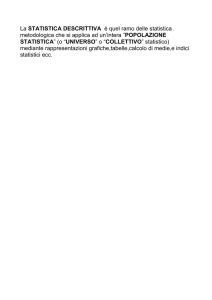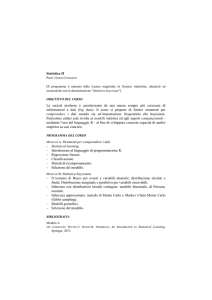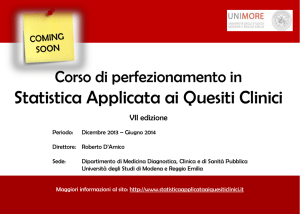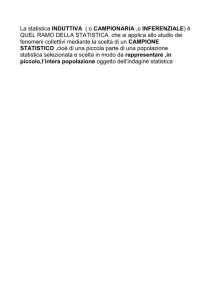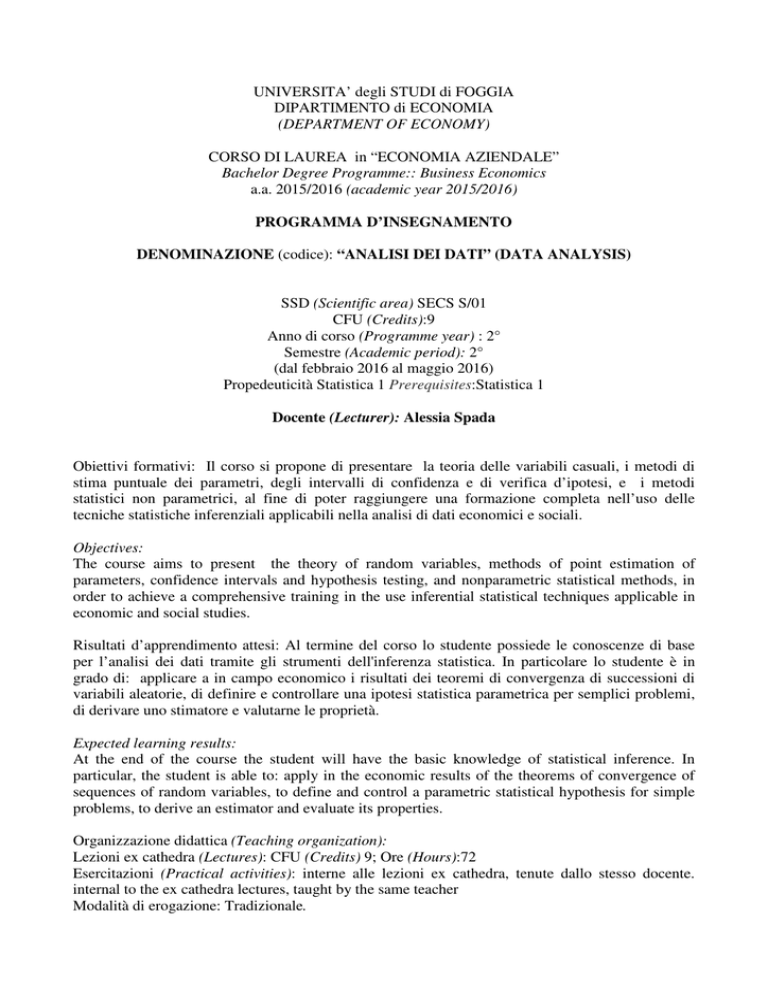
UNIVERSITA’ degli STUDI di FOGGIA
DIPARTIMENTO di ECONOMIA
(DEPARTMENT OF ECONOMY)
CORSO DI LAUREA in “ECONOMIA AZIENDALE”
Bachelor Degree Programme:: Business Economics
a.a. 2015/2016 (academic year 2015/2016)
PROGRAMMA D’INSEGNAMENTO
DENOMINAZIONE (codice): “ANALISI DEI DATI” (DATA ANALYSIS)
SSD (Scientific area) SECS S/01
CFU (Credits):9
Anno di corso (Programme year) : 2°
Semestre (Academic period): 2°
(dal febbraio 2016 al maggio 2016)
Propedeuticità Statistica 1 Prerequisites:Statistica 1
Docente (Lecturer): Alessia Spada
Obiettivi formativi: Il corso si propone di presentare la teoria delle variabili casuali, i metodi di
stima puntuale dei parametri, degli intervalli di confidenza e di verifica d’ipotesi, e i metodi
statistici non parametrici, al fine di poter raggiungere una formazione completa nell’uso delle
tecniche statistiche inferenziali applicabili nella analisi di dati economici e sociali.
Objectives:
The course aims to present the theory of random variables, methods of point estimation of
parameters, confidence intervals and hypothesis testing, and nonparametric statistical methods, in
order to achieve a comprehensive training in the use inferential statistical techniques applicable in
economic and social studies.
Risultati d’apprendimento attesi: Al termine del corso lo studente possiede le conoscenze di base
per l’analisi dei dati tramite gli strumenti dell'inferenza statistica. In particolare lo studente è in
grado di: applicare a in campo economico i risultati dei teoremi di convergenza di successioni di
variabili aleatorie, di definire e controllare una ipotesi statistica parametrica per semplici problemi,
di derivare uno stimatore e valutarne le proprietà.
Expected learning results:
At the end of the course the student will have the basic knowledge of statistical inference. In
particular, the student is able to: apply in the economic results of the theorems of convergence of
sequences of random variables, to define and control a parametric statistical hypothesis for simple
problems, to derive an estimator and evaluate its properties.
Organizzazione didattica (Teaching organization):
Lezioni ex cathedra (Lectures): CFU (Credits) 9; Ore (Hours):72
Esercitazioni (Practical activities): interne alle lezioni ex cathedra, tenute dallo stesso docente.
internal to the ex cathedra lectures, taught by the same teacher
Modalità di erogazione: Tradizionale.
Course modality:traditional
Modalità di verifica dell’apprendimento: prova orale
Examination method: oral examination
Programma dettagliato:
•
•
•
•
•
•
•
•
•
•
Campione casuale (probabilistico), universo dei campioni e variabile aleatoria.
Distribuzione congiunta delle osservazioni campionarie
Distribuzioni di probabilità delle principali sintesi campionarie (statistiche)
Teoremi di convergenza. Il teorema centrale del limite.
Teoria della stima parametrica e non parametrica
Stima puntuale, proprietà degli stimatori, metodi di stima.
Stima per intervalli
Controllo di ipotesi statistiche: test di significatività e test di ipotesi semplici e composte
Statistiche-test per il confronto tra medie, tra frequenze, tra varianze.
Test non parametrici.
Teaching programme (summary):
•
•
•
•
•
•
•
•
Random sampling, sample space and random variables
Probability density functions of statistics
Asymptotic distributions and limit central theorem.
Point estimation: methods for finding and methods for evaluating estimators.
Interval estimation
Testing statistical hypotheses: Fisher significance theory and Neyman-Pearson theory
Test-statistics of comparing means, proportions, variances, distributions.
Non parametric tests.
Testi consigliati (Textbooks):
•
S. Borra, A. Di Ciaccio, Statistica per le scienze economiche e sociali. McGraw-Hill, ultima
edizione. Capitoli 8-17 (tranne il capitolo 15)
Possibili lingue straniere (Additional foreign languages):english.

